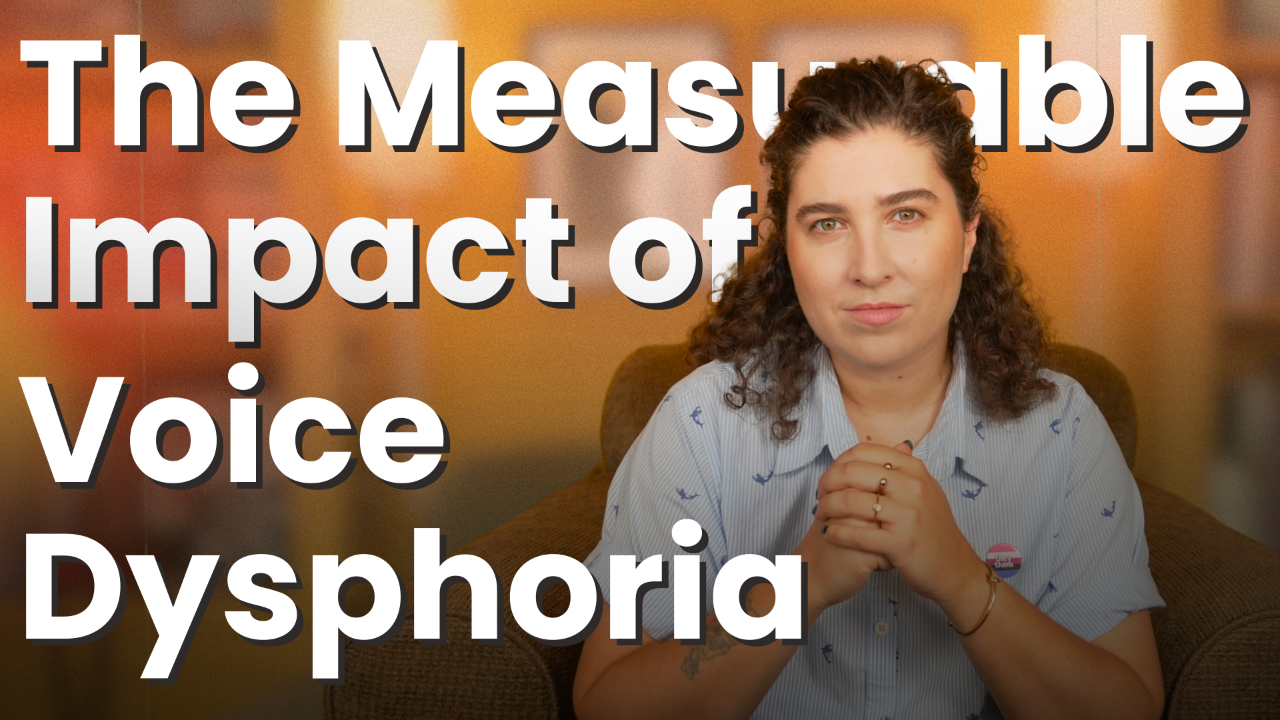Singing on Testosterone: What Trans Singers Need to Know (Interview with Eli Conley)
Nov 06, 2025
When I sat down with Eli Conley—a queer transgender singer-songwriter and teaching artist with over 20 years of experience on testosterone—I knew we'd tackle one of the biggest myths in trans voice training: that going on T means losing your singing voice forever.
Spoiler alert: it's absolutely not true.
If you're a transmasculine, nonbinary, or gender-expansive singer considering testosterone, or if you're already navigating voice changes on T, this conversation is for you. Eli shares the truth about transgender vocal training on T, the science behind voice masculinization, and practical exercises to help you maintain your instrument through the transition.
Table of Contents
- The Biggest Myth About Singing on Testosterone
- What Actually Happens to Your Voice on T
- The Five Stages of Voice Change
- Does Testosterone Dosage Matter for Singers?
- Debunking the "Entrapment" Myth
- Can You Keep Your High Notes?
- Best Vocal Exercises During Voice Change
- Navigating Grief and Joy
- Watch the Full Interview
Watch the Full Interview with Eli Conley
Prefer to read? Keep scrolling for a complete breakdown of our conversation about masculine voice training and singing through testosterone transition.
The Biggest Myth About Singing on Testosterone
"I started taking T in 2006," Eli tells me, "and at the time, pretty much all the information I could find was: I started taking T and then I couldn't sing anymore."
This terrified him. Singing was essential to his identity, yet testosterone felt necessary for his wellbeing.
Twenty years later, Eli is living proof that you can absolutely keep singing on testosterone, and sing well! Yet this myth persists in trans voice lessons and FTM voice therapy conversations.
Why Does This Myth Continue?
The fear often comes from singers who reach the challenging middle phase of voice change and assume it will stay that way forever. But just like cisgender boys going through puberty, the difficult phase is temporary.
What many people don't realize is that with the right approach (whether that's working with a knowledgeable voice teacher, doing targeted vocal exercises, or simply giving yourself time) your voice will stabilize and you'll discover a whole new instrument.
Trans Singer Elders Exist, We Just Need to Look for Them
Part of why this myth persists is a lack of visible trans masculine singers who've been on testosterone for decades.
"Twenty years ago," Eli reflects, "the singers I knew who were on T and who were performers—folks like Joe Stevens, StormMiguel Florez, Josh Klipp—it was really hard to make a living as a trans performer. It still is, but especially in the early 2000s."
Many of these pioneering trans singers aren't as visible in public spaces as some younger performers are today. But they exist, and they're proof that you can have a long, successful singing career on testosterone.
Eli encourages trans singers to actively seek out these elder voices: "Starting to have playlists and examples of singers who are on T at all different stages of life and age, just to hear the diversity—that's really important work."
The more we connect across generations of trans singers, the more we can share knowledge and dispel harmful myths.
Eli has created a YouTube playlist of singers on T that you can check out right now!
What Actually Happens to Your Voice on T: The Science
Understanding the physiology helps reduce anxiety about voice masculinization training and testosterone.
Testosterone Thickens Your Vocal Folds
Testosterone is a steroid that bulks up muscles throughout your body, including your vocal folds. Eli explains it perfectly: "Think of it like a rubber band. A thin rubber band stretches easily to create high pitches. A thicker rubber band (like a broccoli elastic) doesn't stretch as much and vibrates more slowly, making lower pitches easier."
But Your Larynx Doesn't Necessarily Grow
Here's a crucial difference between trans masculine voice change and cisgender male puberty:
For cis boys: Both the vocal folds thicken AND the larynx structure grows larger (creating an Adam's apple).
For trans folks on T: The vocal folds thicken, but the larynx structure itself doesn't necessarily get bigger.
This means you may not develop a prominent Adam's apple, and you may be working with a slightly different configuration than cis male singers, but that doesn't mean your voice won't be fully masculine or that you can't sing beautifully.
Your Entire Vocal Tract Changes
Voice masculinization isn't just about pitch drop. Testosterone also changes:
- The shape of your jaw
- Your neck structure
- Your facial features
- Your throat space
- The size of your resonators (sinuses, mouth shape)
These changes affect your timbre and resonance, the qualities we associate with "masculine" versus "feminine" voices beyond just pitch.
Voice Changes Happen to Everyone
Before we go further, it's worth noting: voice change on testosterone isn't uniquely disruptive.
Voices change throughout our lives for many reasons:
- Cisgender women's voices often deepen during menopause due to hormonal changes
- Pregnancy can permanently shift vocal range (Eli mentions a friend whose voice dropped from soprano to alto during pregnancy)
- Everyone's voice naturally changes with age, regardless of gender
- Illness, injury, and disability can all affect the voice
Taking testosterone is simply an active choice to change your voice, rather than waiting for passive changes. It's not "ruining" your instrument, it's making an intentional modification, which is morally neutral.
As someone who's nonbinary and aging, I'm actually enjoying the natural voice lowering that comes with getting older. Voice change can be a joyful part of life, whether it's from testosterone, time, or other factors.
The Five Stages of Voice Change on Testosterone
Eli's colleague Peter Fullerton—another trans masculine voice teacher and researcher—has extensively studied voice change on T, adapting research from John M. Cooksey's work on adolescent voices to understand transgender voice transition.
Peter's research shows that voice change on testosterone follows a predictable, sequential process with five distinct stages. The entire journey typically takes 2-5 years to complete, though the length of each stage varies by individual.
Important to know: A low dose of testosterone may slow the transition process but will ultimately cause the same voice change as a full dose. Some people choose to stop testosterone before completing all five stages, which can result in a voice that sits in a non-binary, gender-ambiguous range.
Peter has created an incredibly helpful slideshow breaking down all five stages in detail. You can access it here.
Here's an overview of what to expect:
Stage 1: The Onset of Voice Change
What's happening:
- No significant pitch drop yet (or only extremely subtle changes)
- Voice may feel "off," similar to having a cold
- Singing range decreases—you may lose access to some higher notes
- High notes become tight or breathy
- Voice loses some richness of tone
This stage can feel confusing because you know something's changing, but it's not dramatic yet. Many singers don't even realize the process has started.
Stage 2: Voice Begins to Drop
What's happening:
- New low notes start emerging
- Vocal registers and passages begin dropping lower in pitch
- Significant voice cracking when trying to hit high notes
- Difficulty with register transitions and coordination
- Vocal tone may be thicker, darker, and less resonant (due to inflammation and swelling)
- Harder to project your voice
Peter's advice: Stick to singing within the range that feels comfortable on any given day. Don't force or push your voice to produce high notes or add volume to new low notes.
Stage 3: Chaos Ensues
This is the stage Eli and I discussed extensively in our interview—the hardest period that typically lasts 1-2 months.
What's happening:
- The most severe vocal symptoms emerge due to increased laryngeal inflammation
- Fortunately, this is the shortest stage!
- Difficulty with agility (voice feels clumsy)
- Stamina issues (voice feels tired easily)
- Trouble producing clear tone (voice may be husky, breathy, or hoarse)
- Range may be extremely limited
- Head voice/falsetto may disappear completely
- Some singers experience "holes" in their range, often around middle C
Peter's advice: Don't panic or catastrophize! These symptoms are exceptionally distressing but temporary. Be prepared to rest your voice as much as possible. This is not the time to record an album or perform a lead role in a musical.
Stage 4: Stability Within a New Normal
What's happening:
- Range, registers, and passages may still drop a little further
- Voice continues "masculinizing" as the vocal tract changes shape
- Range is still limited but begins to expand
- Agility is still compromised (voice feels clumsy)
- Head voice/falsetto may still be inaccessible or may start to return
- Vocal tone becomes clearer but may still sound light or thin
- Voice still feels less powerful (this improves with time)
Peter's advice: Spend time exploring and gently exercising your new low notes. You can try register coordination exercises, but don't worry if you aren't seeing improvements yet—you may just need more time. Focus on relaxation rather than projection or range expansion.
Stage 5: Emerging New Voice
What's happening:
- Voice continues masculinizing as the vocal tract grows and changes shape
- High notes may still be tentative or unstable (but continue improving)
- Greatest ease and comfort is typically in the lower range
- You may need to lower your speaking voice range—speaking too high for your new voice can negatively impact singing technique
- You'll need to adjust your singing technique to your new voice to avoid developing tension
Peter's advice: Continue focusing on relaxation in your low and middle voice, and use that as a foundation for expanding range. Frequent register coordination and agility exercises will help you regain these skills faster.
What to Expect Overall
- Average pitch drop: About one octave
- Voice part changes: Sopranos typically become tenors, mezzos become baritones, altos become basses
- Timeline: Most dramatic changes in the first year; fully settled by 2-5 years
- Individual variation: Everyone's experience differs based on dosage, genetics, and starting voice
A note about stopping testosterone: If you stop taking T at any stage, your temporary symptoms will resolve, but any pitch changes that have already occurred are permanent. Your voice will stabilize wherever it is at that point.
Does Testosterone Dosage Matter for Singers?
One of the most practical questions singers ask: should I adjust my testosterone dosage to protect my voice?
While I'm not a medical professional and dosage decisions should always be made with your healthcare provider, Eli offers valuable insight from his two decades of experience working with trans singers.
Starting Low Can Create a Smoother Transition
"If you want to have as smooth a vocal transition as possible," Eli explains, "I do think starting lower and then gradually ramping up, if you intend to ramp up, is helpful rather than starting at a quote-unquote full dose."
Here's why this matters for singers:
Twenty years ago, most people started testosterone at relatively high doses (around 100mg per week). This caused rapid voice changes, which contributed to the myth that T "breaks" your singing voice.
Starting with a lower dose allows your voice to adjust more gradually, giving you time to:
- Adapt to each change before the next one hits
- Maintain better control through the transition
- Reduce the intensity of the chaos phase
- Keep singing more comfortably throughout the process
You'll Still Reach the Same Endpoint
The reassuring news? Whether you start low or high, you'll typically end up in the same vocal range.
Starting on a lower dose just means:
- The journey takes longer (possibly the full 5 years rather than 2)
- The changes feel less overwhelming
- You have more time to adjust your technique along the way
You Can Stop Testosterone at Any Time
This is crucial information many singers don't know: you're not locked into a specific endpoint.
Eli emphasises: "You can always stop taking hormones at any point. Even though the voice change is permanent, your voice won't go back to what it was before. You don't have to fully drop into whatever tenor, baritone, bass range you might end up on if you stay on T."
Finding Your Range as a Nonbinary Singer
For some nonbinary singers, this flexibility is especially meaningful.
"That's something that feels really good for some nonbinary singers," Eli notes, "to drop into maybe tenor-alto range and then say, 'All right, I think I'm good. I'm going to go off for a while and navigate this instrument as it is now and see what I think.'"
You might decide to:
- Start testosterone and see how you feel at each stage
- Stop when you reach a range that feels right for you
- Take a break and potentially restart later if you want further changes
- Stay on a low dose indefinitely rather than ramping up
Important note: If you do restart testosterone after stopping, the changes will pick back up from where they left off. Your voice won't drop indefinitely because everyone has a genetically predetermined endpoint.
Working with Your Healthcare Provider
When discussing dosage with your doctor or endocrinologist, you might mention:
- Your goals as a singer and desire for a gradual transition
- Interest in starting with a lower dose and adjusting based on how your voice responds
- Questions about what dosage options are available
- Your plan for monitoring voice changes and potentially adjusting dosage
Remember: your wellbeing comes first. If you need testosterone for your overall health and gender affirmation, that may matter more than protecting your singing voice. But if you have flexibility in your approach, starting low can make the singing journey easier.
Debunking the "Entrapment" Myth
You may have heard about "vocal entrapment" which is the idea that because your vocal folds thicken but your larynx doesn't grow, you'll end up with a voice that feels permanently squeezed or strained.
Eli addresses this directly: "I've never had a student that I would describe as entrapped."
Where This Idea Came From
Researcher Alexandros Constansis wrote about this phenomenon in the 2008, working with singers who:
- Were on relatively high doses of T
- Were in the early stages of voice change (under 5 years on T)
- Often hadn't received proper vocal training during transition
Constansis later walked back this concept, noting he wasn't observing "entrapment" in more recent research.
Recent work by voice teacher Peter Fullerton and voice professional Tessa Romano, published in the Journal of Singing, has challenged this concept further. Their research shows that what appeared to be "entrapment" was actually:
- Temporary inflammation during the voice change process
- Singing in the wrong vocal range (trying to sing tenor when you're actually a bass)
- Lack of proper technique rather than a permanent physiological problem
Peter has worked with singers who might have been labeled "entrapped" using Constansis' original criteria. With proper training, time, and, crucially, figuring out their actual voice range, these singers developed open, powerful voices.
The Importance of Longitudinal Research
Part of the problem, Eli notes, is that most research on trans voices focuses on people in their first 2-3 years on testosterone.
"It's kind of like if you were studying male voices and you only studied 18-year-olds," Eli explains. "That does not represent the full population."
We need more long-term studies of trans singers 5, 10, 20+ years on testosterone to fully understand vocal development. The anecdotal evidence from trans singer elders suggests that voices continue to open up and gain strength well beyond the initial transition period.
With time, vocal exercises, and finding your true vocal range, voices that initially seemed "entrapped" open up beautifully.
Can You Keep Your High Notes on Testosterone?
This is one of the most common questions in FTM voice therapy: "Will I lose my high notes completely?"
The Honest Answer About Range
First, the reality check: "Sometimes I have people come in asking how they can keep the same range and just gain lower notes," Eli says. "Well, I'm sorry..." He trails off with a laugh, recognizing it's an impossible ask.
Your range will shift. On average, about an octave lower. Your highest high notes from before T won't be accessible anymore.
But that doesn't mean you lose all your high notes, they just move to a different part of your range.
Falsetto and Head Voice
Your head voice will change significantly. Many singers describe it as feeling more like a "falsetto" quality rather than the connected head voice they had before.
The good news? You can maintain access to these higher sounds with proper technique:
During active voice change:
- Accept that head voice might be temporarily inaccessible
- Don't force it during the chaotic phase
After your voice settles:
- Practice gentle "ooo" or "eee" sounds starting around middle C
- Keep it breathy and easy—don't push
- Work where your voice naturally wants to shift between registers
- Gradually expand your range over time
What About Belting?
If you love a powerful, chesty belt sound, you can absolutely maintain that skill, but:
- Wait until your voice has settled before working on belting
- Your belt range will be lower than before (your break moves down too)
- Make sure you have head voice access first—belting without this causes strain
- Work with a teacher who understands masculine voice training
Eli offers this perspective: "Belting is a more extreme vocal behavior. It's not that it's unhealthy, but it is just a more athletic kind of sound." You want to work back into it carefully, step by step, with proper support.
Not Everyone Needs to Belt
Here's something important to remember: you don't have to belt to be a legitimate singer.
There's sometimes an unspoken "belting supremacy" in singing culture: the idea that powerful, high belting is the pinnacle of vocal technique. But this simply isn't true.
Many beautiful, successful singing styles don't involve belting at all:
- Folk singers
- Jazz vocalists
- Classical singers who use head voice
- Singer-songwriters with breathy, intimate styles
- Choir singers
"I honestly wasn't much of a belter pre-T," Eli shares. "It just wasn't a sound that I used very much. And these days as a tenor, it is something that I use. But so many styles of singing, so many different ways to sing. If you like belting, great. But if you don't want to do it, totally fine."
If belting isn't your thing, or if you decide not to rebuild that skill after your voice changes, you're still a complete, valid singer.
Best Vocal Exercises During Voice Change
During the most chaotic phase of voice change, less is more.
General Guidelines
- Sing only in your comfortable range (usually chest voice/speaking range during active change)
- Don't push for high notes or force new low notes—let hormones do their work
- Stop if you feel tension or pain (weird is fine; pain is not)
- Focus on relaxation over expansion
Recommended Exercises
Gentle Scales
- Simple 3-5 note patterns on "ah" or "oo"
- Stay in an easy, comfortable range
- Think: exploration, not workout
Yawn Sighs
- Big, easy yawns that slide from high to low
- Releases tension in the throat
- Helps maintain register flexibility
Semi-Occluded Vocal Tract (SOVT) Exercises
- Lip trills
- Humming
- Straw phonation
- These feel soothing and reduce strain during voice change
Want to try out five easy SOVT exercises? Check out this blog post! Although it is directed at trans feminine people, all the SOVT exercises can be used for trans masculine people too.
Gentle Glides
- Slide between registers without worrying about cracks
- Think: exploring the space between chest and head
- Remember: cracks are normal and healthy, not a sign of damage
Eli has an excellent YouTube video about vocal relaxation exercises for trans masculine folks that goes into more detail about massage techniques and relaxation practices.
And I have a free follow-along voice warm-up that you can access now!

Voice Warm-Up Videos
Follow along with me as I teach you a secret weapon to help you gain control of your voice.
What NOT to Do
- ❌ Try to maintain your pre-T vocal range by straining
- ❌ Push through pain or significant discomfort
- ❌ Work on advanced techniques like belting or extended range
- ❌ Compare your voice daily and panic about changes
- ❌ Perform demanding repertoire during the chaos phase
Navigating Grief, Joy, and Everything in Between
One of the most powerful parts of my conversation with Eli was discussing the emotional complexity of voice transition.
It's Okay to Grieve
Even when testosterone is the right choice for you, it's completely normal to feel sad about losing the voice you had, especially if you loved singing with it.
"I think it's really important to honour that grief," Eli says. "If you're losing something that you loved or felt connected to, it makes total sense to feel lost. It doesn't mean you're not also excited for what's coming."
Reject the Linear Narrative
Trans experiences aren't one-size-fits-all. You don't have to:
- Have hated your body before transition
- Feel only joy about every change
- Maintain a perfectly positive narrative about your transition
You can simultaneously feel:
- Excited about your voice dropping
- Sad about losing your high range
- Grateful for testosterone
- Frustrated during the chaotic phase
- Proud of your progress
- Uncertain about the future
All of these feelings can coexist.
Find Community
Eli emphasises the importance of connecting with other trans singers:
- Peter Fullerton hosts monthly gatherings for singers on T
- Eli teaches group classes several times per year
- Facebook, Reddit, and Discord communities exist for trans singers
- Finding just one other person who understands makes a huge difference
"Community is where I found most of the information about trans stuff over 20 years," Eli reflects. "Talking to people who know you, who support you, and who can hold that complexity with you is so important for mental health."
Remember: You're Learning a New Instrument
Eli offers this beautiful reframing: "If you're a really good guitar player and then you pick up a mandolin, it's going to take a minute to learn it. But you can absolutely learn it."
You're not starting from zero. You already know:
- How to breathe for singing
- How to phrase musically
- How to read music (if you did before)
- How to connect emotionally to songs
- How to perform
The muscle memory will adjust. The mapping will change. But the musician inside you? That stays exactly the same.
Key Takeaways for Trans Singers on Testosterone
- You won't lose your singing voice permanently. The challenging phase is temporary, and with proper support, you can sing beautifully on testosterone.
- Your voice will change significantly—about an octave lower on average—but you'll gain a whole new instrument with practice and patience.
- The chaos phase typically lasts 1-2 months. During this time, focus on vocal relaxation and singing comfortably rather than pushing your range.
- Starting on a lower dose and ramping up gradually can create a smoother vocal transition if you have flexibility with your healthcare provider.
- You can stop or adjust testosterone at any time. Your voice won't revert, but you can find your comfortable range and stay there if you choose.
- "Entrapment" is largely a myth. With time and proper technique, voices that initially feel strained open up beautifully.
- You can maintain access to high notes, they'll just be in a different part of your range (falsetto/head voice).
- Wait until your voice settles before working on advanced techniques like belting, and remember that belting isn't required to be a great singer.
- Grief is valid and normal. You can feel multiple emotions about your transition simultaneously (excitement, sadness, frustration, joy) and all are legitimate.
- Find community with other trans singers. You're not alone, and connecting with trans vocal elders can provide invaluable guidance.
- Work with a knowledgeable teacher who understands trans voice training if possible. Voice training during transition helps tremendously.
Resources for Transgender Vocal Training
Connect with Eli Conley
- Website: EliConley.com
- Instagram: @EliConleyMusic and @EliConley.Teaching
- YouTube: Eli Conley's channel with vocal exercises and performances
- Info sessions with Eli Peter Fullerton about singing on T (check Eli's website for dates)
- Group classes for trans singers (offered several times per year)
- Eli's Resources for Singers on T all on one handy page!
Trans Voice Research & Community
- Peter Fullerton's website - Trans masculine voice teacher and researcher
- WPATH Standards of Care - Evidence-based guidelines for transgender healthcare
- The Transmasculine Voice: A Guide to Vocal Euphoria by Stephen Davidson
Continue Your Voice Training with Renée
Whether or not you have started testosterone, I offer resources on your voice masculinization journey:
- My Voice and Testosterone playlist on YouTube
- A free follow-along voice warm-up
- More freebies in my freebies library!
- My signature course, Masculinize Your Voice Without Testosterone
- and of course, some related blog posts below.

Masculinize Your Voice Without Testosterone
Support Organizations
- Trans Lifeline - Peer support hotline run by trans people, for trans people
- The Trevor Project - Crisis intervention and suicide prevention for LGBTQ+ youth
- PFLAG - Support, education, and advocacy for LGBTQ+ people and families
Final Thoughts: Your Voice, Your Journey
Twenty years ago, Eli Conley made the brave choice to start testosterone despite fears about losing his singing voice. Today, he's a thriving performer and teacher helping other trans singers navigate their own transitions.
His journey, and the growing community of trans singers on T, proves that voice masculinization doesn't mean sacrificing your music. It means learning a new instrument, one that can be just as expressive, powerful, and authentically you.
Yes, there will be awkward phases. Yes, you might crack on notes that used to be easy. Yes, you'll need patience and self-compassion.
But on the other side? A voice that feels like home, with the full capacity to share your music with the world.
Have questions about singing on testosterone or masculine voice training? Drop them in the comments on YouTube. Eli and I both love connecting with trans singers navigating this journey.
If this interview helped you, please share it with another trans or nonbinary singer who might need to hear this message.
Want more expert insights? Check out my interviews playlist where I talk with voice actors, singers, speech pathologists, and other voice practitioners about everything from trans voice training to vocal health. Each conversation brings unique perspectives you won't find anywhere else.
Ready to explore gender-affirming voice work?
Want weekly tips, resources, and insights on trans voice training? Sign up for my newsletter and get the latest content delivered straight to your inbox. It's free!













